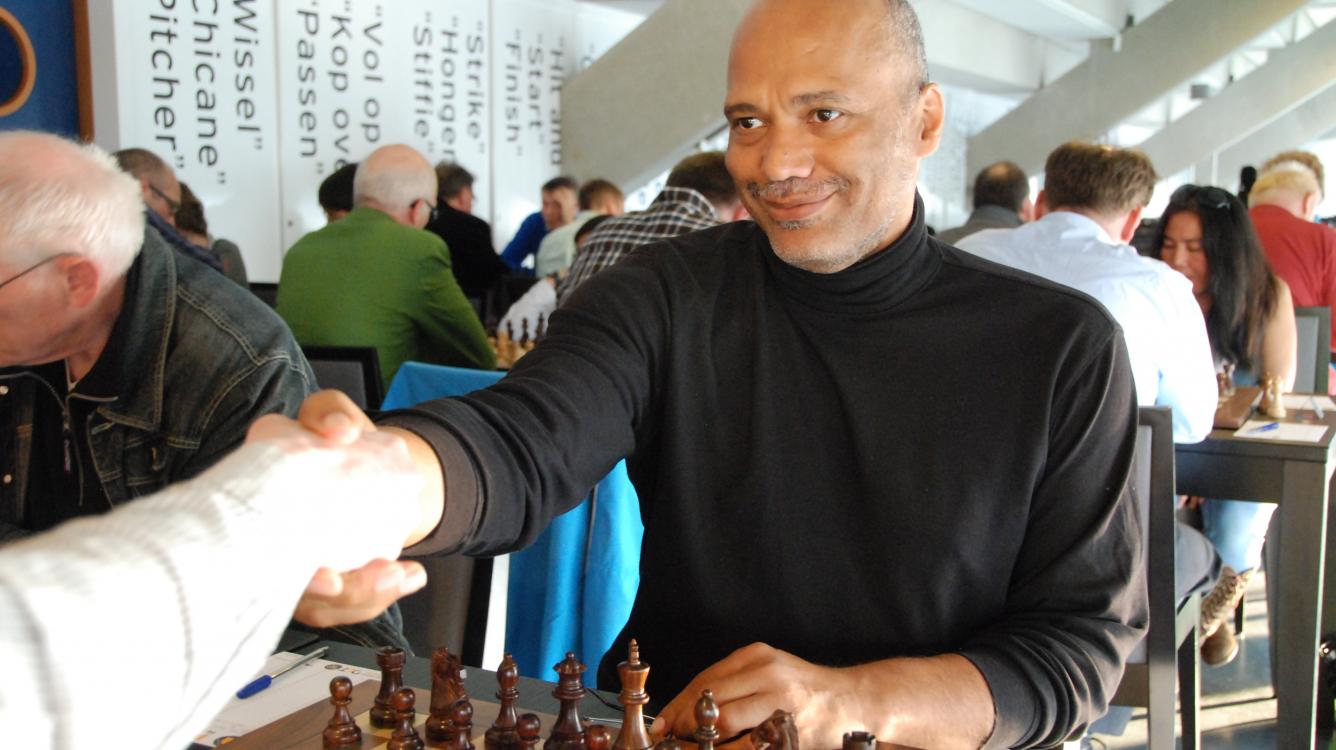
IM Emory Tate, 1958-2015
Not every chess legend has "GM" before his name. IM Emory Tate used an uncompromising style and indefatigable h-pawn throughout his multi-continental career.
His energy on and of the board finally came to an end Saturday, dying in the middle of a game at a chess tournament near San Jose, CA. The news was confirmed by Chess.com late Saturday night by GM Cristian Chirila.
[Image right courtesy Panthena Open]
Tate was many things -- a trailblazing African-American player, a decorated U.S. Air Force champion, a gambler, a boaster, a fearsome attacker, and a loving dad.
He is survived by two sons and one daughter: Andrew, 28, Tristan, 27, and Janine, 25. Andrew Tate, a professional kickboxer, told Chess.com, "My dad taught me everything. Absolutely everything. And my fighting style in the ring mimics his on the board.
"When I was first learning to kickbox he would get mad at me for having my hands up. He would say I’m not a turtle and I have nothing to hide from. We focused on offense. I still fight with my hands down and head movement. All out attack."
Dr. Daaim Shabazz, editor of the The Chess Drum, has chronicled the career of Tate and wrote this about the man on his web site: "A swashbuckling tactician who will try to slash you to bits as brilliantly as possible." Upon his death, Shabazz told Chess.com Tate was a "special player who shared generosity of himself and talents."
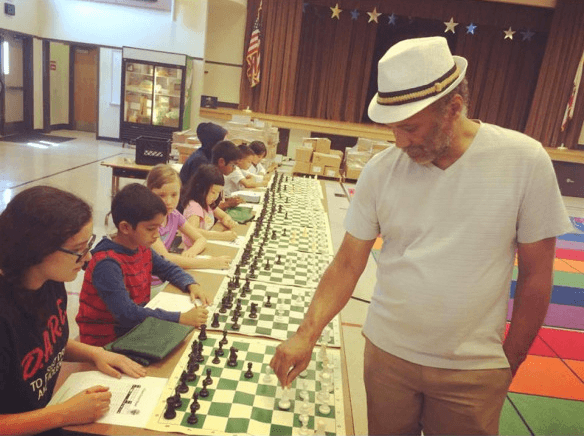
Rank-and-file players who met Tate at a tournament would often be treated to an impromptu recreation of how he'd just beaten a grandmaster using some sort of aggressive system. There was no slowing Tate down until the end.
"Emory Tate was absolutely a trailblazer for African-American chess," GM Maurice Ashley said. His super tactical style as well as his incredibly entertaining post mortems were legendary. His charisma and charm captivated anyone who met him, and his love for chess permeated every pore of his being."
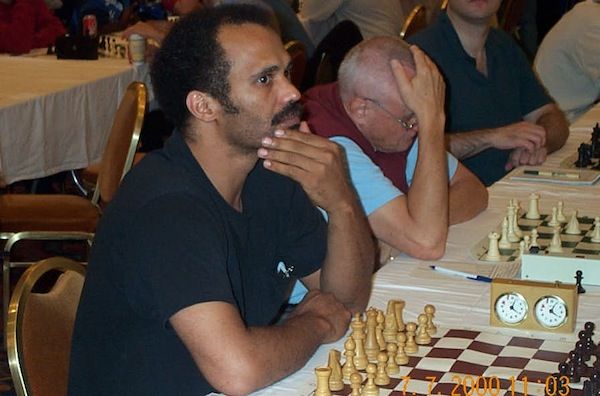
Seated at his board Saturday with a view of the restrooms, Chirila said, "During the first round of the afternoon he came out of the restroom, mumbled 'Call 911,' and the next second he collapsed." He said he did not sense anything wrong with Tate in the opening two rounds of the tournament.
According to Chirila, play stopped at the GM Sam Shankland Championship and players exited the tournament room. Bay Area Chess Director of Enrichment Abel Talamantez phoned for help and "players tried to give him first aid." Chirila added that the fire department arrived within five to 10 minutes.
The tournament resumed after one hour but Chirila said after "watching [Tate] collapse like that" he was merely "pushing the pieces" when the tournament resumed.
Tate had 1.5/2 to open the tournament and his last game necessarily went down as a loss to Expert Yuan Wang.
He will be remembered as the most decorated U.S. serviceman in chess history. Tate won the U.S. Armed Forces Championship five times in the 1980s. His wins chronicled his rise through the U.S. Air Force, as his first came as a senior airman, he second as a sergeant, and the final three as a staff sergeant.
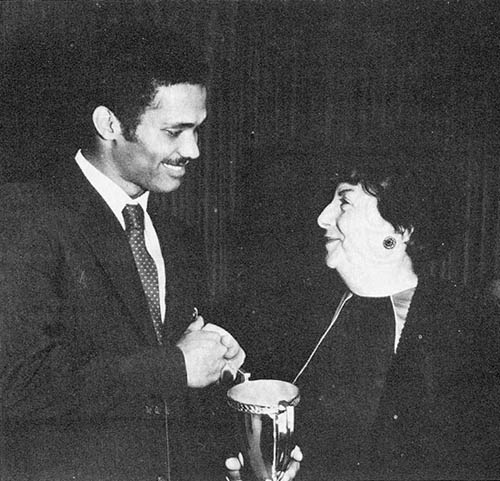
The Chicago native grew up in Indiana but hopped back to the Windy City often to play chess. He eventually would win the Indiana State Championship six times as well.
Tate crisscrossed the U.S. in the 1990s, playing in open tournaments from coast to coast. His U.S. Chess profile page lists more than 600 tournaments just since 1991.
He also had a penchant for a peripatetic lifestyle, spending months in Europe and often clustering tournaments in one area. His peak published U.S. Chess rating reached 2499 in 1997 (he made 2500 in his live rating after the U.S. Masters that year), but curiously his FIDE topped out nearly a decade later at 2413, allowing him to earn the international master title just before his 50th birthday. Fittingly, he earned his final norm at an open tournament (the World Open in 2006).
Andrew Tate said this of his father's ascetic lifetsyle: "He was a man who was at home in his own skin. He didn’t need or want a house or a car or a little garden to feel at home. He was happy anywhere...He didn’t have a wife or a lot of material possessions but he was a genius. Make no mistake -- not only in chess, at everything."
He rarely held back his beliefs. Within the last week he posted on his Facebook page about police brutality and other topical issues, claiming that he was thrice beaten by police.
His Wikipedia page advertises more than 80 grandmasters wins (which is likely even lower than his final lifetime amount). Here's one from early in his career where Tate refuses to accept that his queen will not prevail. In the final position, 61. Qh2+ wins a piece, so Black resigned.
Tate treated minor pieces like pawns -- sacrificing them caused him no greater concern than dropping a penny. He also loved Open Sicilians, and often his opponents never made it out of the opening.
After son Andrew won an Indiana State Championship himself at the age of five, Emory played his son without looking at the board but while making dinner. Tate won in a Sicilian.
His most oft-quoted game may be this one. Against a top grandmaster, he offered a knight for long-term play. As was typical, he threw ever piece of wood on the fire until his opponent's king was incinerated:
His lack of formal training caught many off guard, but occassionally this worked against him too. Tate was once checkmated by GM Alex Yermolinsky in nine moves. Ever the connoisseur of a lightning attack, Tate allowed the mate to appear on board.

This next game comes with a few asterisks. It was played at a time control of G/30 and it came when his opponent was yet to reach master, but Tate still punished GM Fabiano Caruana's queen sortie convincingly. See if you can do the same:
Tate played in one U.S. Championship in 2006. Typical of his style, in nine games he drew exactly none (+4-5=0). His biggest win came against GM Varuzhan Akobian where the underdog played much more restrained than usual, but he still got around to sacrificing a piece eventually.
In his final year of life, he played several events in Bulgaria, captured his final first place in the Netherlands, then played several tournaments in the Bay Area of California including his last.
This is the game that clinched his final tournament win. Tate was still pushing his h-pawn until the end:
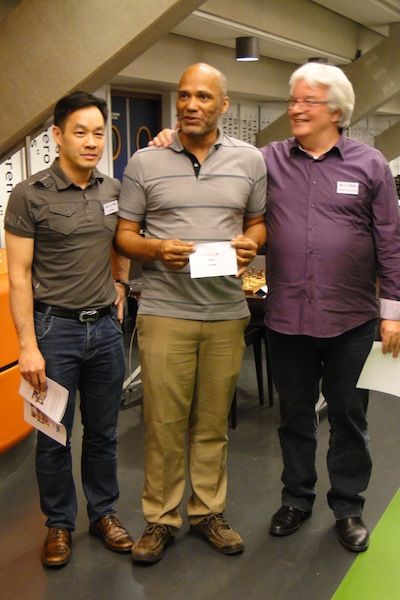
IM Emory Tate, middle, posing for a winner's picture after taking the Panthena Open this year in Rotterdam. (Photo courtesy official site)
Later in life he began coaching, and according to Shabazz, he was still reaching for the grandmaster title (presumably the World Senior Championship would have been the best avenue, as at the time of death his FIDE had fallen to the 2200s).
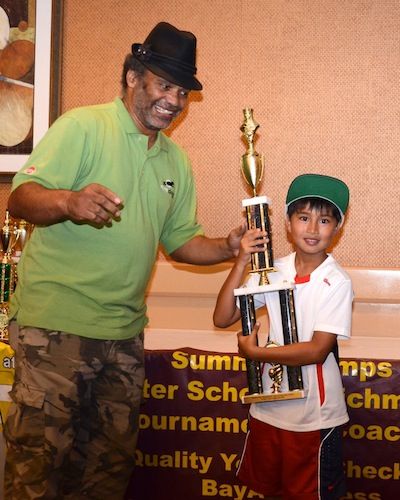
In the mid-1990s, he stayed in North Carolina for a short time, where this reporter grew up. I saw Tate use a backgammon "doubling cube" for cash blitz games, a new one for me that produced wonderment. He regaled audiences with bombastic replays of his latest wins, leading to more than the usual fear when I sat across to play him.
We fought over the board three times. This encounter, our first, was indicative of his entire career. If you play an kingside fianchetto as Black, Tate was nearly obligated to play h4 in the first 10 moves, sometimes sooner.
Little did I know that my wayward idea of winning an early piece only helped expedite the attack. Tate used every bullet in his gun and I consider this one of the lucky escapes of my career:
His h-pawn could charge as Black just as easily, as he showed in this scalp against a three-time U.S. Champion:
Stories and memorials poured in on social media late Saturday and early Sunday. Many spoke of the "hole" that will be there at open tournaments across the U.S.
Chess teacher NM Craig Jones called Tate "the most charismatic and entertaining player ever" in American chess history.
Our own Vice President, IM Daniel Rensch: "If anyone wants to see the greatest game ever played, give me a chessboard and gather round" - Emory Tate, immediately after walking into the skittles room at the National Open (I can't remember the year... but I could not have been more than 13 or 14 years old).
This was my first experience of the man. What the game might have lacked in substance (regarding his claim), he easily made up for with his entertaining, colorful, hilarious and very often crude (bordering on vulgar) analysis. He controlled the room for the next hour. He had a lasting affect on me and my feelings that chess analysis could and SHOULD be a fun, entertaining and enjoyable experience for all.
Emory truly was a legend. I had the pleasure of playing him several times, with every game ending in a spectacular (and I mean spectacular) draw. But even more than his moves on the board, his presence off the board was always felt, in any and every tournament hall he entered. He will be missed.
Frequent Chess.com and ChessKid.com contributor FM Todd Andrews mentioned a period when Tate lived in Alabama and his pride in a dominant Southern player. The Tennessean wrote that after Tate's whiskey drinking: "I would soak up his animated annotations on chess, tactics and what most would consider a twisted glance of the world. I believed that Emory believed every word he said. I saw a truth in his convictions...While he was no stranger to controversy, he also knew how to encourage. We traveled the Northeast together. We both found ways to hustle up gas money to get to the next event. We got lost and somehow found our way back again. He was always proud of his children."
Grandmaster Jesse Kraai, also of Northern California (where Tate's final U.S. Chess address was): "Really bummed to learn that Emory Tate collapsed playing a game today. He was one of those guys everyone liked to talk about, but no one really understood."
IM Stuart Rachels, former U.S. Champion: "Tate was a lunatic, a creative genius, a 2400 with more talent than a hundred GMs or a single [Kamran] Shirazi. Underneath he was disarmingly sweet, even timid."
GM Sam Shankland, whose name was attached to Tate's final tournament: "Emory Tate was his own description. Those who knew him or encountered him could never really describe him in words. He lived as a legend of sorts, immune to adjectives, you just had to experience him or hear some stories about him to get the tiniest glimpse into who this man was. He definitely was a person who treaded that commonly described fine line between brilliance and insanity, and in that way he reminded me a little of Bobby Fischer."
More from GM Maurice Ashley to Chess.com: "He was an inspiration to me early on in my career as his no holds barred approach against any opponent showed an utter fearlessness that one could only hope to emulate. I'll never forget the 'bite the bullet' tongue lashing he gave me when he insisted I switch from 1.c4 to 1.e4, despite my protestations that I was in no way prepared to make such a radical change. Good thing I listened to him as it altered the trajectory of my game and proved to be just what I needed to broaden my approach to chess. He was always ready to dole out such advice, whether the listener was ready to hear it or not. No one will ever say that he was not a fully authentic human being. Emory was always Emory, damned whoever was watching."
They played only twice; of their first meeting, Ashley said, "The final position is amusing: we had nothing left to sacrifice and reluctantly had to accept a draw! We actually chuckled at each other, two fighters gaining much respect for each other's attitude at the board."
"Players like him do not come along every day, every month, every year. He was one in a generation, and he will be thought of, always, with a chuckle and a smile. No doubt he is challenging Tal to some blitz right now. May he rest in peace."
Andrew Tate posted this on his Facebook page: "He is the smartest man I have ever met bar none. People called him crazy. But I understood him. And regardless of his abnormal thinking he turned me into a brilliant person. You can't argue with the methods if the result is flawless. And he was a world level chess master who gave me the skill I needed to live a life worth living. It is impossible to replace a man like him. Everyone thinks their father is special I'm sure, but my dad genuinely was. Our last conversation was the beginning of a poem. I will finish it myself in the coming days. First I have tears to shed. RIP Emory Andrew Tate."
Andrew related his father's favorite quote to Chess.com: "My unmatched perspicacity, coupled with my sheer indefatigability, combine to make me a feared opponent in any realm of human endeavor."


